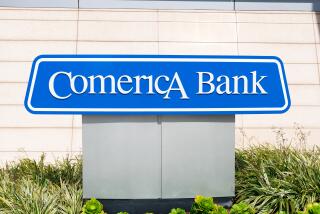First Interstate Closes Deal to Buy Allied Bancshares : Bank’s First Venture Into Texas Is Its Largest Acquisition; Stock-Swap Merger Could Total as Much as $450.4 Million
- Share via
First Interstate Bancorp said Thursday that it has agreed to acquire Allied Bancshares of Houston for securities valued at between $415.1 million and $450.4 million.
The deal, which was wrapped up early Thursday morning only a week after the two firms announced their preliminary merger discussions, marks First Interstate’s first foray into Texas. Allied Bancshares is First Interstate’s largest acquisition and will become the Los Angeles-based financial institution’s 24th bank in 13 states.
Analysts last week had estimated that the merger might be worth as much as $600 million. But that was before it was disclosed that Allied will spin off $250 million in bad loans as part of the deal and expects a $100-million operating loss in the second quarter.
The value of the deal was estimated Thursday at $10 to $10.85 a share by Montgomery Securities and Morgan Stanley & Co., both investment bankers hired by Allied. First Interstate did not make public the estimates of its investment banker, Goldman, Sachs. But Frederick J. Elsea, First Interstate’s senior vice president of financial planning, said, “Those numbers, I think, are reasonable.”
“We have admired Allied and their management,” Elsea said. “We have been following Texas very closely over the last couple of years, and (First Interstate Chairman) Joe Pinola has made no secret of our desire to get into the third-largest (banking) market in the United States.”
Allied is considered to be one of the strongest of the Texas banks, which have been pummeled by slumps in energy and real estate. Allied, the sixth-largest bank holding company in Texas and ranked 53rd nationwide at the end of 1986, reported its first loss last year.
“Allied feels like it had the option, the very viable option, to remain independent,” Jay C. Crager Jr., Allied’s executive vice president and chief financial officer, said. “At the same time, First Interstate was very attractive to us to affiliate with” because of its geographical distribution and financial strength.
The new capital available for “product enhancement . . . will allow us to get back into the marketplace aggressively and to be the profitable bankers we have been for years,” Crager said.
First Interstate said it expects Allied’s management to remain with the company after the deal is closed at the end of the year. The transaction is subject to shareholder and regulatory approvals.
The deal is structured much like the recent merger of Texas Commerce Bancshares and Chemical New York, so that the risk is reduced for the acquiring company.
For example, Allied agreed to add $112 million to its loan-loss allowance, anticipating net chargeoffs for the second quarter of about $96 million. That will result in an operating loss of slightly more than $100 million for the second quarter, compared to operating income of $10.2 million in the same period of 1986.
That provision makes Allied, rather than First Interstate, take the losses from those bad loans before the deal is completed, said Joseph T. Arsenio, an analyst with the investment banking firm of Birr, Wilson in San Francisco.
In addition, the common and preferred stock that First Interstate is issuing will pay dividends that are tied to Allied’s earnings.
What’s more, Allied will transfer $250 million worth of non-performing assets, primarily real estate loans, to what it called a “special bank,” and the shares of that separate entity will be distributed to Allied shareholders. Shareholders will receive distributions from the collection of those assets.
“It’s a good move for First Interstate,” said Donald K. Crowley, a senior vice president in the San Francisco office of the investment firm of Keefe, Bruyette & Woods. “We view Allied as one of the best-managed banks in Texas, which is obviously a difficult environment to be working in.”
“First Interstate had to continue to make some acquisitions in order to avoid being a target itself come, say, 1991,” Arsenio said.
“The question is,” he added, “after you sanitize the transaction (to reduce risk) do you still get an adequate return?” Arsenio said he will have to speak with First Interstate management before deciding on that.
More to Read
Inside the business of entertainment
The Wide Shot brings you news, analysis and insights on everything from streaming wars to production — and what it all means for the future.
You may occasionally receive promotional content from the Los Angeles Times.










